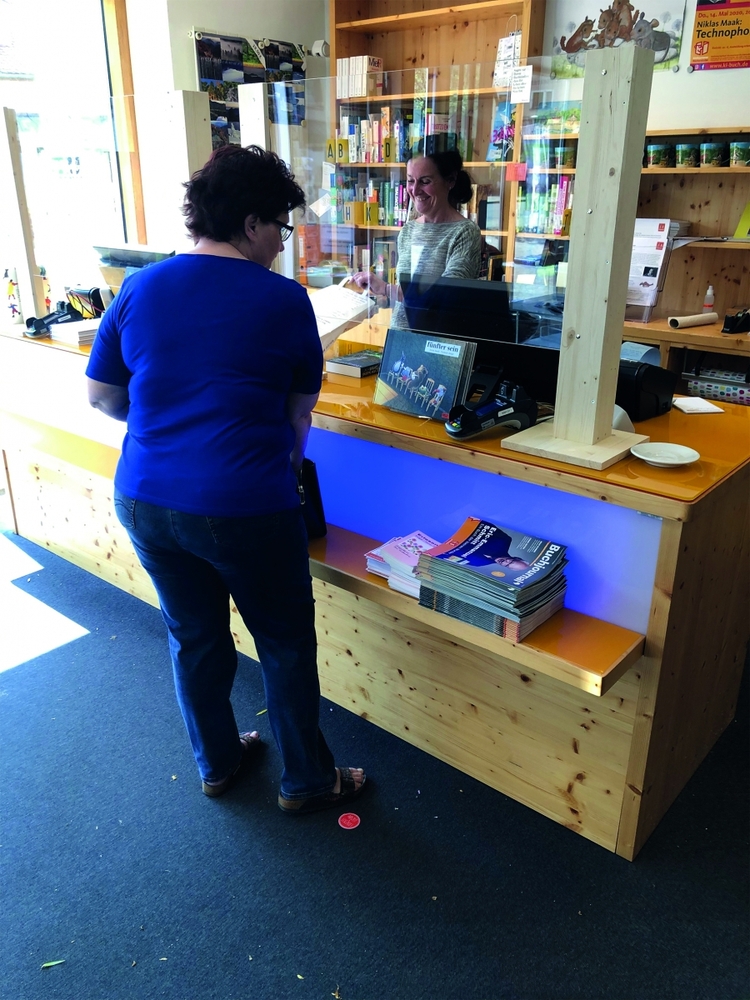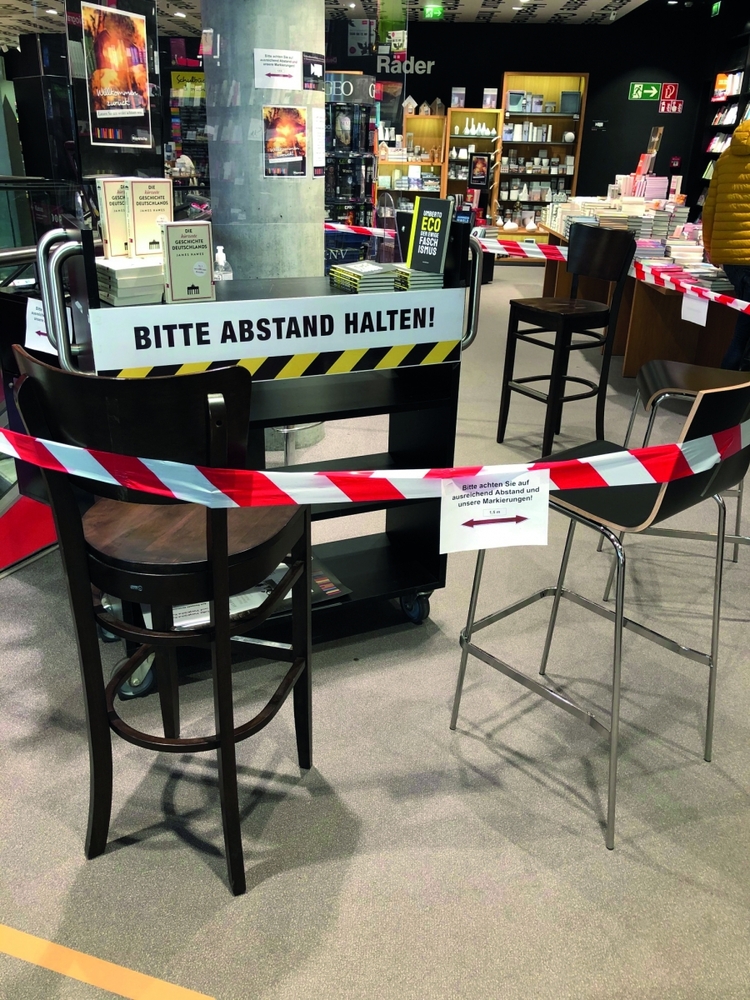You are viewing your 1 free article this month. Login to read more articles.
German booksellers share experiences of reopening shops
When German booksellers exited lockdown last month, shops reopened to a new reality far different to the relaxed atmosphere before Covid-19. Each bookshop is navigating the pandemic individually, but all are adhering to state-wide and local guidelines, closely assisted by the trade association Börsenverein des Deutschen Buchhandels.
The day after the announcement that restrictions were to be eased, Börsenverein issued a digital briefing, with information ranging from checklists on how to adapt bookshops and appropriately interact with customers, to applying for special government pandemic grants. This paper is constantly updated and serves as a blueprint for the pandemic.
Since the lockdown, Börsenverein has also made promotional material from its bookshop brand campaign Jetzt ein Buch! (And Now a Book!) available free of charge, for use in-store, on booksellers’ online shops and social media channels. Additionally, seitenreich, the association’s benefits programme for members, has introduced discounts on anti-virus protection such as mobile acrylic barriers, keep-your-distance stickers, washable face masks and disinfectant dispensers.
 All of these are in strong demand from booksellers, as is evident when entering a store. Masks are compulsory for customers and staff with regular customer contact. Floor markings and warning tape are everywhere, outlining the required social distancing of one-and-a-half to two metres, indicating walking routes and waiting lines for the tills, as well as separate entry and exit doors where possible. Another must-have is protective shields at tills and information points throughout stores, ranging from makeshift curtains of strong plastic to professionally installed acrylic or Plexiglas panels.
All of these are in strong demand from booksellers, as is evident when entering a store. Masks are compulsory for customers and staff with regular customer contact. Floor markings and warning tape are everywhere, outlining the required social distancing of one-and-a-half to two metres, indicating walking routes and waiting lines for the tills, as well as separate entry and exit doors where possible. Another must-have is protective shields at tills and information points throughout stores, ranging from makeshift curtains of strong plastic to professionally installed acrylic or Plexiglas panels.
Hand sanitiser is plentiful and used by customers voluntarily with increasing regularity. Posters everywhere indicate the rules of conduct. Most shops will only allow a limited number of customers in at a time. To stay on top of the numbers, regional book chain Osiander, for example, keeps shopping baskets outside its larger branches. When all are in use, the doors will be closed temporarily. Each basket is thoroughly disinfected before being placed outside again.
Bookshops across Germany—except for those in the eastern state Sachsen-Anhalt and the capital, Berlin—went into lockdown on 22nd March along with all other non-essential retailers after a period of restricted trading. Four weeks later, on 20th April, they were among the first retailers the government allowed to reopen without restrictions on the size of the sales floor; other shops had to stick to 800 sq m.
Not surprisingly, the lockdown hit German booksellers hard. Figures published by trade newspaper Buchreport (in co-operation with Media Control) for March and April make dismal reading whichever way you look at them. Overall sales—including online shops, travel shops, department stores and others—were down 20.2% in March and 33% in April. But bricks-and-mortar bookshops were hit harder during the two months, down 30.3% and 46.9% respectively.
Steep learning curve
Reopening was a steep learning curve, says Joachim Wrensch of Braunschweig-based family-owned Graff, one of Germany’s best-known indies. Since Graff reopened customers have been steadily returning, but numbers are still down on pre-coronavirus trading. And buying patterns have also changed noticeably. “Consumers are buying much more purposefully and spend less time browsing,” says Wrensch, who is anxiously awaiting the figures for May.
The month started positively enough. Figures for the first week, and anecdotal reports from booksellers since then, tentatively suggest bookshops are profiting from further easing of regulations, among them opening restaurants and cafés, with tough hygiene measures in place. Book sales overall were up marginally (0.5%) week on week. And while bricks-and-mortar bookshops were down 6.8%, this was widely expected owing to the continued slump in travel literature, normally a strong driver of in-store sales at this time of year.
 There are two “takeaways” from how German booksellers exited the lockdown. One is the collective enthusiasm and resourcefulness with which even the smallest bookshop went about reopening. If there were doubts or health concerns among staff, these never publicly surfaced in any significant shape or form. Talking to booksellers, there is instead an overwhelming feeling of relief at being able to go back to work amid precautions. The only unease is the still very real fear of local Covid-19 hotspots unexpectedly flaring up, which would lead to renewed restrictions in the area.
There are two “takeaways” from how German booksellers exited the lockdown. One is the collective enthusiasm and resourcefulness with which even the smallest bookshop went about reopening. If there were doubts or health concerns among staff, these never publicly surfaced in any significant shape or form. Talking to booksellers, there is instead an overwhelming feeling of relief at being able to go back to work amid precautions. The only unease is the still very real fear of local Covid-19 hotspots unexpectedly flaring up, which would lead to renewed restrictions in the area.
The other is related to the much-increased online business many booksellers saw during the lockdown, and their innovative ways of getting books to customers. Some booksellers started using bike couriers to deliver books during the lockdown; they were so popular that many bookshops are planning to retain them indefinitely.
Pictures: protective screens at Kirchzartener Buecherstube in Baden-Württemberg (top) and distancing measure in Mayersche, Dusseldorf (right).
Anja Sieg is The Bookseller's Germany correspondent.


















